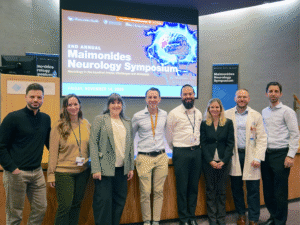More than 5,200 people receive a cancer diagnosis in the United States every single day. It’s a life-altering event that can shake even the calmest patients. There’s nothing they can do to predict or prepare for how it affects them or their families physically, mentally, or emotionally.
Dedicated healthcare professionals at Maimonides Cancer Center see patients processing these complex experiences and emotions. They developed the Cancer Supportive Services team to better serve them. Jeremy Winell, MD, leads this invaluable team as Director of Behavioral Services. Together, they have dramatically improved cancer patients’ experiences by prioritizing mental health, nutrition, and supportive care.
Multidisciplinary Teams Collaborate to Provide Each Cancer Patient with Comprehensive Care
In addition to oncologists, surgeons, and other healthcare providers who focus on treating cancer, each patient also has access to the Maimonides’ Cancer Supportive Services team if they need it.
“This team works collectively to help patients and families as they cope with the challenges caused by cancer,” explained Dr. Winell. “Team members include a psychiatrist, psychologist, two social workers, a dietitian, and a supportive care physician for pain and palliative care.”
Referrals to the Cancer Supportive Services team are reserved for patients experiencing undue distress during or after their cancer treatment. “The oncology teams are good at recognizing some of the signs and symptoms of distress,” said Dr. Winell. “And every patient has a formal distress screening questionnaire at the beginning of their treatment. If the screening indicates a moderate to high level of distress, they’re referred to Cancer Supportive Services.”
Integrated Cancer Services are Beneficial for Patients and Families of All Ages
Both adults and children receive support from Maimonides’ Cancer Support Services team. There’s also a level of support for families of cancer patients through family counseling in some cases. “Our social workers help families and caretakers access resources to help their loved ones,” Dr. Winell said.
This 360-degree approach to cancer care is beneficial because it helps cancer patients process their experience, while also giving them the tools they need to make it through their treatment. And including family members helps them process difficult feelings as they work toward the road to remission and recovery.
The Cancer Support Services Team Continues to Grow and Expand While Prioritizing Patients
Dr. Winell and his team are always looking into services and programs that will help patients make it through their cancer treatment. Between a newly launched quarterly virtual lecture series for patients, in-person, mindfulness-based cognitive therapy support group sessions, and plans for in-person yoga classes, there are supportive services for each and every cancer patient that walks through Maimonides’ doors.
“Each patient’s cancer journey is different,” Dr. Winell said. “What is a crisis for one patient may not be one for another patient facing the same situation.” And Maimonides’ Cancer Support Services team is capable of helping them through it all.
Cancer Support Services are accessible by referral for Maimonides Cancer Center patients. For more information on Cancer Center and for cancer screenings, visit https://maimo.org/treatments-care/cancer-center/ or call (718) 765-2500.




